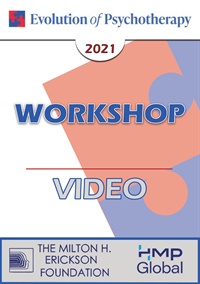EP21 Workshop 07 - Stress: The Mind/Body Relationship to Physical Health - Gabor Maté
- Average Rating:
- Not yet rated
- Topic Areas:
- Workshops
- Categories:
- Evolution of Psychotherapy | Evolution of Psychotherapy 2021
- Faculty:
- Gabor Mate
- Course Levels:
- Master Degree or Higher in Health-Related Field
- Duration:
- 2 hours
- Format:
- Audio and Video
- Original Program Date:
- Dec 01, 2021
- License:
- Never expires.
Description
Stress is ubiquitous these days — it plays a role in the workplace, in the home, and virtually everywhere that people interact. It can take a heavy toll unless it is recognized and managed effectively and insightfully.
Western medicine, in theory and practice, tends to treat mind and body as separate entities. This separation, which has always gone against ancient human wisdom, has now been demonstrated by modern science to be not only artificial, but false. The brain and body systems that process emotions are intimately connected with the hormonal apparatus, the nervous system, and in particular the immune system. Emotional stress, especially of the hidden kind that people are not aware of, undermines immunity, disrupts the body's physiological milieu and can prepare the ground for disease. There is strong evidence to suggest that in nearly all chronic conditions, from cancer, ALS, or multiple sclerosis to autoimmune conditions like rheumatoid arthritis, inflammatory bowel disease or Alzheimer's, hidden stress is a major predisposing factor. In an important sense, disease in an individual can be seen as the “end point” of a multigenerational emotional process. If properly understood, these conditions can provide important openings for compassion and self-awareness, which in turn are major tools in recovery and healing.
Dr. Maté’s presentation includes research findings, compelling and poignant anecdotes from his own extensive experience in family practice and palliative care, and illuminating biographies of famous people such as athlete Lance Armstrong, the late comedienne Gilda Radner, or famed baseball legend Lou Gehrig. The presentation is based on When The Body Says No, a bestselling book that has been translated into more than twenty-five languages on five continents.
Topics covered:
1. The mind/body unity as explained by modern science (psychoneuroimmunology);
2. The nature of stress and its physiological consequences;
3. The three major stressors: Loss of Control, Uncertainty; and Conflict;
4. How the early environment “programs” us physiologically and psychologically into chronically stressful patterns of feeling and behavior;
5. Why stress remains hidden in our culture;
6. The stressful work environment: how to recognize it and transform it;
7. How to recognize stress and prevent it;
8. How the understanding of stress can inform and enhance clinical practice.
Learning Objectives
- Develop an understanding of mind/body unity as explained by modern science (psychoneuroimmunology).
- Examine nature of stress and its physiological consequences.
- Distinguish three major stressors: Loss of Control, Uncertainty; and Conflict.
Credits


